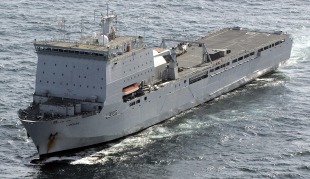Landing platform dock RFA Largs Bay (L3006)
Basic information
- After 2011 — HMAS Choules (L100)
Ship measurements
Machine
- 2 * Wärtsilä 8L26 generators, 6,000 hp (4.5 MW)
- 2 * Wärtsilä 12V26 generators, 9,000 hp (6.7 MW)
- 2 * azimuthing thrusters
- 1 * bow thruster
Personnel
Combat assets
- 1,150 linear metres of vehicles (up to 24 Challenger 2 tanks, 32 M1A1 Abrams tanks, or 150 light trucks)
- Cargo capacity of 200 tons ammunition or 24 TEU containers
- 1 * LCU Mark 10
- 1 * LCM-8 or 2 * LCVPs (Royal Marines version or RAN version)
- 2 * Mexeflote powered rafts
- EID ICCS integrated communications control system
- 1 * Phalanx CIWS
- Blackhawk and Seahawk helicopters frequently embarked; flight deck can operate helicopters up to Chinook size
- No permanent hangar; temporary hangar can be fitted
HMAS Choules (L100) is a Bay-class landing ship that served with the Royal Fleet Auxiliary (RFA) from 2006 to 2011, before being purchased by the Royal Australian Navy (RAN). The vessel was built as RFA Largs Bay by Swan Hunter in Wallsend, Tyne and Wear. She was named after Largs Bay in Ayrshire, Scotland, and entered service in November 2006. During her career with the RFA, Largs Bay served as the British ship assigned to patrol the Falkland Islands in 2008, and delivered relief supplies following the 2010 Haiti earthquake.
At the end of 2010, Largs Bay was marked as one of the vessels to be removed from service under the Strategic Defence and Security Review. She was offered for sale, with the RAN announced as the successful bidder in April 2011. After modifications to make her more suited for Australian operating conditions, the vessel was commissioned in December 2011 as HMAS Choules, named after Royal Navy and Royal Australian Navy Chief Petty Officer Claude Choules. A propulsion transformer failure kept the ship out of service between July 2012 and April 2013.
- Comments
 en
en ru
ru uk
uk


 Royal Fleet Auxiliary
Royal Fleet Auxiliary Royal Australian Navy
Royal Australian Navy